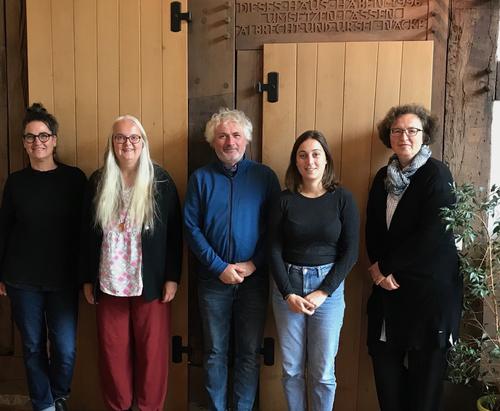Report from the boot-camp of the European Spa team at Bad Salzuflen in August 2021
News from Aug 31, 2021
Report from the boot-camp of the European Spa Team in Bad Salzuflen in August 2021
- Matrix of European spa terminology and data crowdsourcing
- Renaissance poetry and current health policy
From August 25 to 29, the team of The European Spa met in the North Rhine-Westphalian spa town of Bad Salzuflen for the first meeting that could take place in person again after the pandemic. The agenda included planning for future public events, such as exhibitions at our partner museums in Harrogate (UK) and Opatija (HR), as well as joint conceptual work. Thus, the team designed a matrix to outline the development of European spa terminology. Just as the German term "kurort" migrated to other European languages such as Russian in the late 18th and 19th centuries, the English-language term "spa," itself originally a derivation from the town name of the Belgian thermal bath Spa, has dominated since the late 20th century. Also, after recognition of their legal status as such, a wide variety of prefixes are attached to spas in their respective linguistic contexts, such as "Bad" (German), "Les Bains" (French), "Fürdo" (Hungarian) or "Caldas" (Spanish). Such a map of European spa terminologies can reveal the cross-national and cross-linguistic entanglements of the phenomenon.
But of course we also used our stay in the region, which is characterized by its numerous thermal sources, for excursions and on-site research as well as discussions with spa officials and administrators. In doing so, we deepened the contacts we had made at our last working meeting in nearby Bielefeld, where - still at the height of the pandemic - we were lucky enough to be hosted by the local Center for Interdisciplinary Research ZIF. So we met again this year with Arnold Beuke, head of the Bad Salzuflen municipal archives and current chairman of the Association of German Baths Museums. Among other things, we talked about the possibilities of using data crowdsourcing to involve the staff of German spa museums in the work with our database Nodegoat. The idea behind the concept is to use the expertise of colleagues in the field to collectively generate an increasingly complete map of German, and in the future, European health resorts. Important issues are on the one hand the design of a simple technical input form and - programmatically - rendering transparent the benefits of such data sharing for the participating institutions.
A visit to the spa facilities of the town was, of course, also obligatory, which the team took on in two groups: one visited the thermal spa, the other tasted thermal water from the "bar" in the newly designed Wandelhalle (promenade room), which has recently also served as an exhibition space for the history of the town and spa. The modernization of the Wandelhalle, which was erected in the early 1960s, is a successful example of how post-war architecture can become a structural highlight in a bright, modernist style.
Another highlight was undoubtedly our participation in the international literature festival "Poetic Sources," curated by Michael Scholz in the nearby spa of Bad Oeynhausen, with which we co-operate. Tobias Roth presented his translation from the Latin of Giovanni Pontano’s (1429-1503) poetry written in, and devoted to, the Italian spa "Baiae." The Italian Renaissance poet here developed a socio-erotic utopia: "The laws of the baths" demanded the satisfaction of spiritual and physical needs, but also the observance of peace between its visitors. Although Pontano's "Baiae" is about an epoch, the Renaissance, which we do not deal with specifically in our project, we were able to find many parallels to the modern spa, especially its character as a private and social utopia, which, however, can only ever be realized for a limited time – be that only for the duration of reading a poem. For those wishing to take such a mini spa break, we warmly recommend Roth’s Pontano to all those able to read either German or Latin. During the festival, we also met Beate Krämer, the director of Staatsbad GmbH Bad Oeynhausen, who together with Michael Scholz and Christian Barnbeck from the non-profit association Agora have been our Associated Partners since 2020. Among other things, we talked about the various ways and forms of revitalizing spa towns, not only in light of the Covid 19 pandemic. As Ms. Krämer and Mr. Barnbeck reported, for some time now mineral water from the town's sources has been offered for drinking again in Bad Oeynhausen, which has been gratefully accepted by visitors and even brought about a revival in demand for bathing treatments. Ms. Krämer also drew attention to the quite spectacular news that since the summer of 2021, spa cures have once again been included in the services paid for by the health insurance fund in Germany – a practice that had been abolished in the 1990s. This development, which is gratifying for the German spa towns, has been the subject of political discussion for some time, but it was ultimately also triggered by the Covid pandemic in that it became clear that preventive and follow-up health care cannot be the sole responsibility of the individual. And thus, in our boot camp, historical, scientific, cultural and political aspects of contemporary spa culture came together. We would especially like to thank our interlocutors and Associated Partners for the time and expertise they shared with us.

